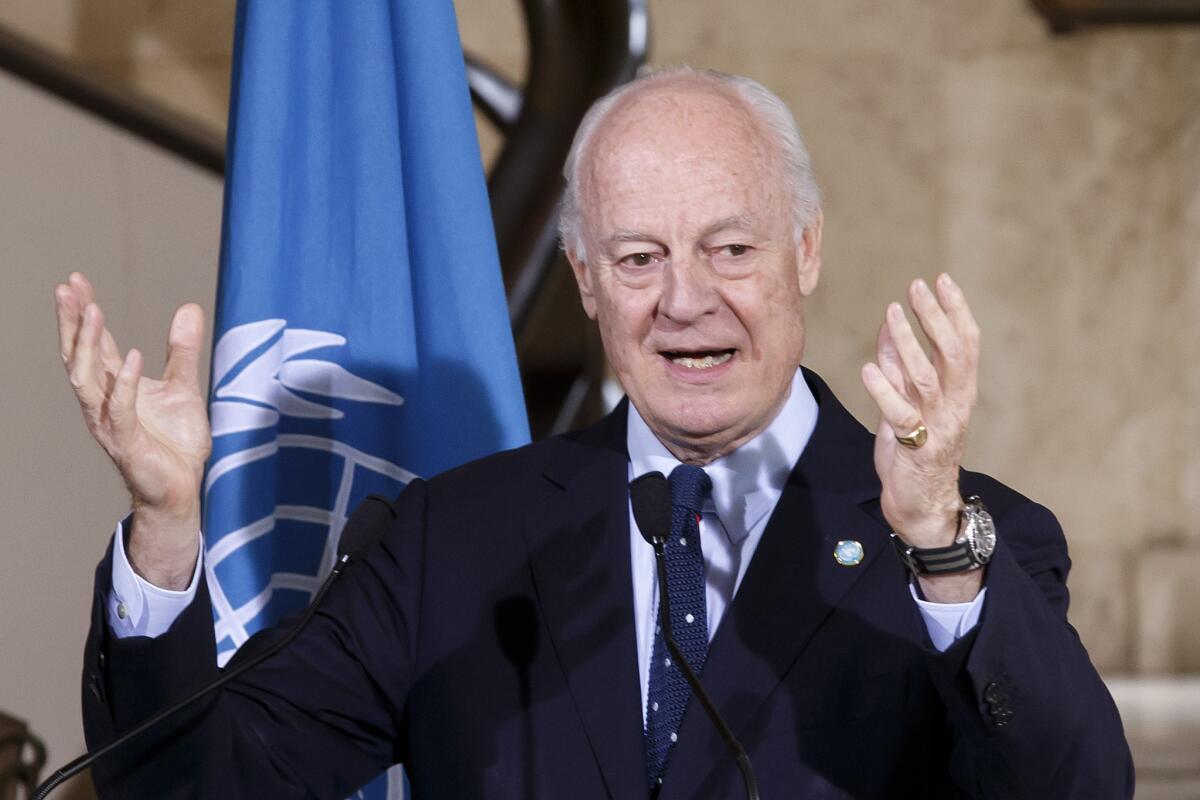Islamic State overruns parts of refugee camp in Syria where civilians face starvation

United Nations special envoy to Syria Staffan de Mistura speaks to the media during a press conference after a round of negotiations, at the European headquarters of the U.N. in Geneva on Monday.
Reporting from Beirut — Islamic State extremists in Syria dislodged other militant groups from a Palestinian refugee camp near Damascus on Monday, even as the United Nations warned that weeks-long clashes have spurred horrendous conditions for thousands of civilians.
Activists in the Yarmouk camp, southeast of the center of Damascus, the capital, reported that Islamic State had overrun parts of the camp after the withdrawal and surrender of fighters with the Al Qaeda-affiliated Nusra Front. Islamic State confirmed the attacks in a statement.
The move by Islamic State in Yarmouk came as Syrian opposition fighters attacked government forces in a new offensive in the country’s northwest and opposition leaders said they would postpone participation in peace talks in Geneva.
The opposition’s High Negotiations Committee reportedly said its decision stemmed from the ongoing fighting in Syria. U.N. special envoy to Syria Staffan de Mistura said the opposition delegation was expected to stay in Geneva for discussions.
Also Monday, officials in Turkey said several rockets fired from Syria struck the Turkish border town of Kilis, killing three Syrian children and a Syrian man.
The latest advance in Yarmouk means Islamic State controls more than 70% of the camp, a shambolic sprawl that was once considered the capital of the Palestinian diaspora, with more than 110,000 registered refugees in 2002.
The area is a densely populated urban landscape with shops, schools and stadiums whose control was divided among the 14 Palestinian factions found in the camp, including the Popular Front for the Liberation of Palestine - General Command (known as the PFLP-GC) and Hamas.
Christopher Gunness, spokesman for the U.N Relief and Works Agency, said in a statement Sunday that fighting that began April 6 had affected the most densely populated areas of Yarmouk and has used “heavy weapons, explosive devices and weapons of indiscriminate effect.”
“The impact on civilian life has been devastating,” said the statement, adding that the estimated 10,000 civilians still trapped in Yarmouk faced the specter of “starvation and dehydration.”
“The size and the caliber of weaponry used… it’s extraordinarily disproportionate, and people are hunkering down in their homes to avoid being hit by bullets and shrapnel,” Gunness in a phone interview Saturday.
“Those people are stuck between two fires, and they wake up and find decapitated heads on the sidewalk,” said Abdullah Jumaah, a member of the PFLP-GC contacted by phone from Damascus.
The U.N. has been unable to deliver supplies to Yarmouk because of the fighting, but Gunness said that the U.N. “stands ready to resume its humanitarian missions” in the area. Other groups, such as the Syrian Arab Red Crescent, continue to deliver food and water to the camp, Jumaah said.
Local media outlets, however, reported that the only accessible passage between the government-controlled areas and Yarmouk had been closed by the government.
“With this, the residents of Yarmouk Camp [and adjacent neighborhoods] are totally besieged, for all foodstuffs and goods come through this passage,” said Al-Modon news website.
Last April, Islamic State fighters infiltrated the camp from the adjacent Hajar Al-Aswad district. It has since made steady progress inside the camp, even though it has not yet reached northwestern areas of Yarmouk controlled by factions allied to the Syrian government.
But Islamic State’s renewed assault is an indication that the group is seeking to secure its grip on the dagger-shaped neighborhood, a strategic passageway that leads to the administrative heart of Damascus and the government of Syrian President Bashar Assad.
Yarmouk’s importance has made it the scene of violent clashes throughout the Syrian civil war, now in its sixth year, dividing the Palestinian factions between those who fight on the side of the government and those who have joined the opposition factions seeking to end Assad’s rule.
The fighting pushed out the majority of the camp’s residents, but left thousands to face a punishing siege by Syrian army units that was subsequently relaxed after a U.N.-brokered aid deal.
Bulos is a special correspondent.
More to Read
Sign up for Essential California
The most important California stories and recommendations in your inbox every morning.
You may occasionally receive promotional content from the Los Angeles Times.











